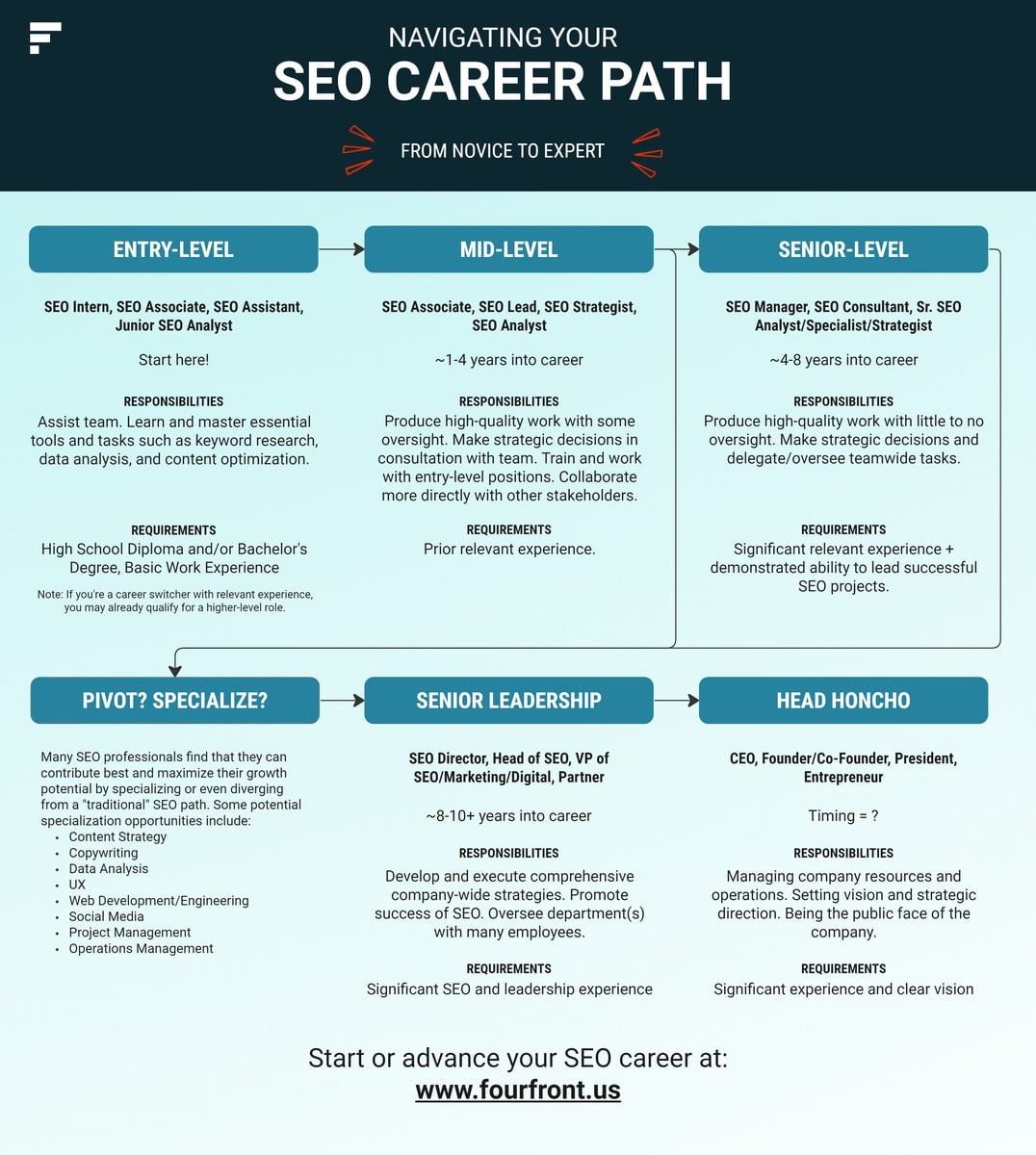This post was collaboratively researched and written by Ben Swofford and Dan Bowden.
Updated: July 3rd, 2023
The simple answer is yes, SEO is a good career. SEO professionals can make good money, achieve a comfortable work/life balance, find a position in the industry that suits their natural skill set, and challenge themselves creatively. An increase in demand for SEO means that there are more jobs on the market daily, and those who enjoy the work will be able to find opportunities that help them feel both fulfilled and secure in their occupation.
We may be biased here at FourFront, but take it from Jared Groff, our Search Engine Optimization Manager:
"SEO is a great career choice for clever and creative marketers who embrace technology. People are turning to the internet now more than ever before, and they're using search engines to find what they're looking for. As this happens, algorithms shift and SEO evolves. It's ever-changing, and staying ahead of the curve both requires critical thinking and allows for a lot of creativity."
Below we take bias out of the equation and answer these common questions about SEO salary, job security, work/life balance, safety, and more.
On this page, you can find this information about SEO careers:
How Much Money Can You Make with a Career in SEO?
According to research by Search Engine Journal, 60% of SEO professionals earn the same or more than the U.S. median. That said, what you’ll actually make depends on a number of factors, including location and years practicing. For reference, Salary.com says that Search Engine Optimization Managers in San Francisco typically make between $90,496 and $124,785, while Search Engine Optimization Specialists in Washington D.C. will typically make between $48,149 to $59,473.
Keep in mind that these represent middle-of-the-road positions. Associates generally make less than specialists, and Directors generally make more than Managers. If you own your own SEO company, then the sky is the limit.
Do SEOs Have Good Job Security?
If growth in demand for SEO professionals is an indicator of job security (spoiler alert: it is), then you can consider this field Fort Knox. SEO is still a relatively new and evolving industry, and since COVID-19 accelerated already astronomically increasing trends towards online shopping and ecommerce, more and more businesses are looking to beef up their online profile. Who will they turn to? SEO professionals.
As a bit of evidence, just check out the relative growth of searches for “seo jobs” overtime courtesy of Google Trends:

Graph Source: Google Trends
What is Work/Life Balance Like in an SEO Career?
This is another place where SEO careers shine. As a new and evolving industry, most employers pay close attention to industry trends and take their cues from leaders in the work/life balance movement like Google. Many companies (including Fourfront) offer great benefits like flexible hours, work from home options, and other perks. At FourFront, we’re always brainstorming ways to improve the working experience for everyone.
Is SEO a Safe Job?
There’s no Bureau of Labor Statistics category for SEO yet… but there is one for Computer and Mathematical Occupations and that’s one of the safest categories to be in. If you have a taste for the macabre, a fun fact is that individuals in this category are 79x less likely to die on the job than the national average.

Is SEO a Good Career for Me?
Whether SEO is a good career for you is a more subjective question, and depends on a number of things:
- Are you adaptable? This is important. SEO is an ever-changing field, so you’ll need to develop new techniques to solve problems on a regular basis. Algorithms will change with or without notice, the platforms and tools you use will rise and fall, and your competitors will always be trying new things that keep you on your toes. Complacency is death in this field.
- Are you competitive? There’s a lot of emphasis on watching Google in the SEO world, but the other part of the equation is watching your competitors. What are they doing on their websites that’s earning them high rankings? Brainstorming new and creative ways to beat out the competition is a big part of the game.
- Do you like working with data? Data is the backbone of any solid SEO strategy. You’ll analyze data in Google Analytics, Search Console and many other platforms to monitor the success of your strategies. If you have a knack for finding new ways to crunch numbers, you may find yourself loving life in a Data Analyst position.
- Do you like working with a team? Two heads are better than one but a whole team is often better than two. At FourFront, we believe that staying on top of changes in the field and finding solutions to new SEO problems requires the different outlooks and skillsets that a full team brings to the table. Collaboration is key.
- Do you like helping people? At the end of the day, SEO is about helping people find information and services. The goal of algorithms used by search engines like Google is to connect users with the websites that are best suited to meeting their needs. As an SEO, you help position your clients’ website to be the best at doing so. Skills as diverse as paid ads management, UX design, and content strategy can come in to play in any given project.
- Can you stand working at a desk? While certain positions will provide you with plenty of face-to-face time with your clients and many companies offer initiatives to keep you healthy, much of SEO requires being firmly planted in front of your computer. That’s not for everybody, so be sure to consider it.
How to Get into SEO
One of the great things about a career in SEO is that an entry level position does not require any prior industry experience or prerequisite knowledge. If you’re looking to get a leg up, there are a number of free courses and industry publications to help jump-start your knowledge. If you prefer a more structured approach, some colleges offer certificate programs, bachelor’s, or even master’s degrees in digital marketing.
At FourFront, entry-level employees often have little to no experience. Many of our team members have joined us as interns in college, and continued to grow with the company. Others have been career-changers who are interested in pursuing something new. When speaking with potential new entry-level hires, we value drive, analytical ability, creative problem solving, a love of learning and generally being pleasant to work with. The rest you can learn on the job.
That said, showing some initiative and interest in an interview always helps you stand out. With that in mind, here are some free resources for those looking to study SEO basics in their free time:
- Moz’s Beginners Guide to SEO
- Search Engine Land (industry news)
- Search Engine Journal (industry news)
- Google’s How Search Works website
- SEL’s SEO Periodic Table (updated annually)
What Career Paths are there Within SEO?
There are a number of positions available for those looking for their first job in SEO. Job searchers are often hired as SEO Associates, Project Coordinators, Content Writers and more. That’s a good way to get your feet wet, but once you know the basics there many directions you can go.

SEO Specialists are responsible for developing and implementing strategies designed to improve their clients’ organic rankings in search engines. They work with data analysts, programmers, and SEO managers to study website performance and identify technical, user experience, and content-related opportunities that will better position a website to meet the needs of its users. SEO Specialists are the front line of the SEO industry and can eventually earn the position of SEO Manager or Director.
How do I become an SEO Specialist?
The first step to becoming an SEO Specialist is to learn the fundamentals of SEO. The resources mentioned earlier in this article are a great place to start, and with a little bit of knowledge and initiative, you should be able to land a job as an SEO Associate or intern. Once you’re on the job, your real education starts. By working on internal and/or client projects with other SEO professionals, you’ll be exposed to the tools and techniques required for the job. These tools include, but are not limited to:
- Google Analytics
- Google Search Console
- Google Trends
- Google Tag Manager
- Google Keyword Planner
- Google Pagespeed Insights
Notice a trend there? If so, great job! Identifying trends is an important skill for an SEO Specialist to have. And until there’s a major disruptive event in the online world, Google is and will continue to be the king of the search engines. You’ll want to be very familiar with Google.
That said, there’s a number of other providers of tools that SEO Specialists find essential to their day-to-day success. Semrush, Moz, Conductor, SpyFu, and other companies offer tools that assist with the keyword research, competitor monitoring, and technical facets that are required for the job. Each SEO company has its own favorites, and in an entry-level SEO job you’ll get to know them well.
A Data Analyst at an SEO company helps process and present the data used by SEO specialists. As mentioned previously, data is the backbone of any good SEO Strategy. Data Analysts assist SEOs by creating reports that analyze search and performance trends as well as uncover technical problems that could be impacting a website’s ability to rank. If you love graphs and charts, and have a knack for finding the story behind the numbers, this position might be for you.
How do I become a Data Analyst?
If you’d like to become a Data Analyst for an SEO company, having a good base knowledge of SEO is important. This will help you understand the big picture behind the numbers you’re crunching and the reports you’re putting together. Additionally, you’ll want a good understanding of mathematical and statistical concepts, strong attention to detail, and good documentation skills.
While there are degree programs that can help you develop these skills, some Data Analysts discover they have a knack for these things while performing the functions of an SEO Associate or Specialist. If that’s the case, then the next step towards a full-time Data Analyst position is developing a deeper understanding of some of the tools used by Data Analysts. These tools include, but are not limited to:
- Microsoft Excel
- SQL
- JQuery
- Python
- Google Data Studio
- Supermetrics
- Visual Basic for Applications
- Screaming Frog
Deep critical thinking skills are another important attribute of a successful Data Analyst. It’s important to be good at crunching numbers,but the other part of the job is being able to contextualize them and consider how the information they provide can be used to glean useful insights. SEO knowledge and an understanding of the wider objectives of a strategy will guide how reports are being presented. Not everyone has the skills possessed by a Data Analyst, so it’s important that the reports one compiles can be easily understood by readers without that same depth of knowledge.
“Content is king” is basically a cliche in SEO, but that doesn’t mean it’s not true. Content is incredibly important to search engines as they crawl a website to determine what it is all about. As a content manager, you’re responsible for recommending ways to improve the quality of the content on your clients’ websites and finding the most efficient way to provide users with the information they need. If you have a strong base of SEO knowledge and a love of the written word, you may want to walk this path.
SEO Specialists who have achieved a deeper level of knowledge than most, and who keep their finger on the pulse of the industry can become SEO Managers or SEO Directors. They are responsible for providing SEO Specialists with the resources they need to do their jobs and providing assistance and mentorship as needed. Different companies will call this position various things, but those working this job will share a love for the field and a passion for bringing it into the future.
Like any field, there are positions required just to help get things done. You may enter a company as an intern and discover that your passion doesn’t lie in that field per say, but rather in keeping the business running. SEO is a business like any other, and as such it requires Salesmen/Saleswomen, Project Managers and Coordinators, legal teams, Operations Managers, and more. A healthy base knowledge in SEO will help you in all of those positions, and even though you won’t be driving strategy you will be an important part of keeping the wheels turning for your team.
Ready to Get Started?
If you’re interested in learning more about SEO and joining a great team, take a look at the open roles our Careers page and let us know where you think we can grow together. If you don’t see a position that catches your eye, feel free to reach out anyway—we love meeting new people and you never know what future opportunities might unfold.









4 Comments
This BLOG is well written. I learned so much from reading it. I will definitely tell my grandson about this company as he loves technology.
Thank you, Michele!
Hello, my name is Minho Lee, a senior at Villanova University majoring in computer science. I went to the career fair on 4/14/2022 at my school and had a chance to talk about SEO field and about FourFront with Ben Swofford. I liked this post because it expends the information that Ben told me yesterday, and gives me clearer version of the field. I personally love to work with data. So I would love to work in this field. Thanks for your time to elaborate all the information regarding SEO. Please feel free to contact me future.
Hi Minho– Thank you for the comment here. I’m very happy to hear this post was valuable to you.
It was nice meeting you in the career fair. Hope to stay in touch and wishing you luck with the rest of your semester!